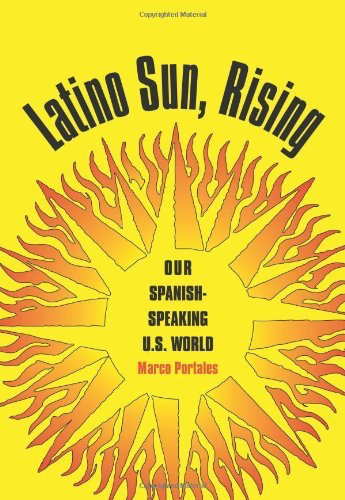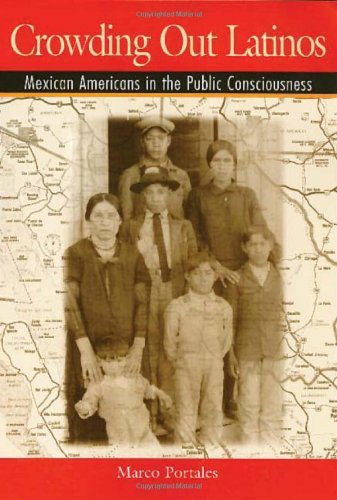Latino Nonfiction Books and a Novel: the U.S. Media, History, Essays, and the Schools we usually attend
My three-generation memoir, Why Affirmative Action Remains Necessary, like the following previous books, can be ordered on Amazon, Kindle, or from your nearest bookstore.

about Marco Portales
Why Affirmative Action Remains Necessary, a Memoir
Affirmative Action accomplishments become evident over the length of a person’s career. A.A. has a great record of improving economic and social status, but beneficiaries still have to work hard to gain from opportunities extended by this 1965 federal law.
WHY AFFIRMATIVE ACTION REMAINS NECESSARY foregrounds the views of Supreme Court Justices Clarence Thomas and Sonia Sotomayor. This memoir then demonstrates how my life would have been totally different without Affirmative Action (like millions of other lives). WHY AFFIRMATIVE ACTION REMAINS NECESSARY asks the U.S. Supreme Court to reconsider the decision that “Affirmative Action is not needed anymore.” This recent ruling unfairly disadvantages students and workers who seek to improve the financial situations of themselves and their families.By turning challenges into opportunities, I describe how dad’s death in 1969 prompted my brother Eddie and I to find work, first as busboys in the Loop of downtown Chicago and the following summer as a mail carrier for an accounting firm in London, England.
Our parents, both immigrants, raised us with the idea that our futures depended on a good college education. I graduated from UT/Austin in 1970. My Chicago summer job helped me move to Austin, and Affirmative Action allowed me to enroll in graduate school in New York state. After four years of study in snowy Buffalo, I married, earned a Ph.D. in English, and began my career as a professor.
In 44 brief chapters, I describe how Eddie and I drove to Buffalo in 1970 where two years later I married a Puerto Rican bilingual teacher. In 1974, Rita and I began a new life in California’s Bay Area. There we raised a son and a daughter while Rita taught in the Oakland schools, and I worked to create a name for myself as a scholar and author at UC/Berkeley.
Disadvantaged students and workers seeking better employment will learn how I worked to turn obstacles into opportunities. Instead of being discouraged by bad encounters and situations, my career demonstrates patience, humor, and steady daily performance.
WHY AFFIRMATIVE ACTION REMAINS NECESSARY improves the chance of success for readers with few resources and social connections. People of color in particular will find this memoir champions inclusion, respect for the people around us, and understanding and appreciation for parents while promoting worthwhile life goals. (Published in 2023 by Amazon and Kindle Direct Publishing; ISBN 979837643806)
Yearners, a novel about Texas Politics
YEARNERS displays what Latinos long for, yearnings Trump ironically strengthened when he targeted people of color during his presidential announcement. But instead of rejecting him, conservatives embraced Trump. They have since used GOP resources and leadership positions to derail the progress of people of color.
After Trump, there is less incentive to help Latinos, an upwardly mobile population. Despite the progress Spanish-speakers have demonstrated in the last 50 years, politicians and the U.S. voting public continue to show little desire to help people of color. That explains why Latino and Mexican American history and culture are being rejected in the schools, colleges, and universities. But ignoring diversity only creates more problems.
YEARNERS features Latinos who put up with today’s realities by doing what occupies people who lack power and leadership positions. They talk and wait, yearning for changes. This novel shows 6 bilingual males, 6 women, and 2 white characters who live and think without excessive sex, violence, and the kind of stories the media often attribute to us. These individuals represent Latino life, culture, and history, showing what engages Latinos while they long for better days.
YEARNERS avoids stereotypes, offering readers diverse Texans since 2002 when wealthy Tony Sanchez lost a bid for Texas governor. The novel blueprints what the next Latino or Latina candidate will face, highlighting how different voting groups can improve life for all U.S. residents.
By questioning today’s realities, YEARNERS exhibits why the separations people follow now keep all of us apart. With YEARNERS, readers hypothetically embrace new realities awaiting the future of the U.S. YEARNERS, readers should know, was rejected by a handful of Texas publishers, and published by the forward-looking Floricanto Press in California in 2017 (ISBN 9781540879189).
A Mexican Revolution Photo History
What do you know about the Mexican Revolution? Do you know that the U.S. was intimately involved in a history that our schools do not teach our citizens?
Here’s the story. In 1846, ten years after the Alamo, President James K. Polk and Congress declared war on Mexico. The U.S. war with Mexico lasted two years, and deprived Mexico of 55 percent of its land, further impoverishing a country long used to poverty and lacking public education and infrastructural amenities. In the early 1860s, France forced Mexico into another war to gain possession of Mexico’s rich resources. But this time Mexico surprisingly defeated France, and Porfirio Diaz emerged as a hero. Diaz then dominated Mexico for more than forty years. After two failed attempts, the poor in Mexico, led by Pancho Villa from northern Mexico and Emiliano Zapata from the south, finally revolted against Diaz in 1910. The Mexican Revolution lasted the first THREE DECADES of the 20th century, with repercussions still felt by its people, the U.S., and the world today. THE PROBLEM IS THAT THIS PART OF OUR U.S. HISTORY IS NOT STUDIED OUR SCHOOLS. EDUCATORS NEVER LEARN THESE FACTS, SO THEY CANNOT TEACH A HISTORY CAPABLE OF IMPROVING OUR RELATIONS WITH MEXICO!Using original pictures taken by Mexican and international photographers, Portales narrates the causes behind the Mexican Revolution. Using public domain pictures and rare-book collections, he unearths some of the less known reasons for the Mexican Revolution.
Here Portales shows how U.S. presidents controlled the guns and the ammunition supplies that determined the outcomes of Mexico’s revolution. Instead of simply reproducing pictures of the revolution, like other photographic histories, this book carefully explains the alliances and deceptions, clarifying who did what to whom, when, and why between 1906 and 1928. The result is a picture book full of surprising revelations that will amaze and educate readers! (Portales first published this photo history in 2010. Kendall Hunt Publishing did so in 2013, and a Second Edition with a Foreword by John Mason Hart came out in 2015.
ISBN 9781465282040)Latino Sun, Rising
Latinos make up the largest minority population in the U.S. today, yet our daily cultural life continues to ignore this growing population. Spanish-speakers make up millions of the working, future middle class, and aspiring professional groups, but the rest of America give us little attention in most areas of life.
In LATINO SUN, RISING, an English professor of American Literature and Ethnic Studies considers the recent past in light of historic and personal instances of success and resistance. In 44 essays on hotly-debated issues seldom addressed, Portales lays out the promise of a new rising sun that shines on all Latinos and Latinas. These wake-up pieces show how Latinos usually work to improve the United States, contributing to the success of all Americans, including neighbors who often misrepresent Latino progress!
In classes at UT/Austin, at SUNY/Buffalo, on the beaches of Corpus Christi, bussing tables in downtown Chicago, working by St. Paul’s Cathedral in London, teaching at UC/Berkeley, and while raising a family in Houston’s NASA area, Portales shows how Latinos promote and celebrate the American Dream.
After featuring the World War II generation of his parents, he retraces the days of his happy youth during the Eisenhower years before unfurling the transformational ethnic consciousness that launched the sixties. LATINO SUN, RISING documents generational changes and advances personal and international stories that demonstrate why Latinos continue to work to improve American life and culture. (Published in 2005 by the Texas A&M University Press, paperback edition in 2007; ISBN 9781585446377)Quality Education for Latinos and Latinas
This University of Texas Press publication underscores the inequalities DISADVANTAGED STUDENTS often face. It explains why U.S. Latinos and Latinas have been less successful than other children. It argues that educators of Spanish-speaking children from Pre-K through college have long not challenged Latino children to do their best. Readers will learn how 35 years of careful observation of teaching methods in Texas, western New York state, and California reveal the educational realities that Latino children have to endure.
While educators, legislators, and researchers debate how to improve American schools, Rita and Marco Portales show how the interactions between teachers and students–the most important school relationship–often is not implemented with Latino children. How a teacher interacts with each student in the classroom, from day one, determines whether a student will be prepared to receive an education. Too many Latino, Latina, and students of color are often discouraged by school interactions that should empower them. Facing administrative and teacher biases, exclusionary practices, social prejudices, and racism, teachers fail to use curricula that improves English-language skills that shape outcomes. Education schools in universities also dismiss, ignore, and downplay student needs year after year.
QUALITY EDUCATION avoids promoting education theories and practices that change every 3 to 5 years because educators are doing what they call “research.” This book instead asks parents, teachers, and administrators to work with students on a daily basis, both inside and outside of the classroom, to reduce cultural barriers. The objective is to help ALL students acquire a quality education by placing good teacher-student relations at the center of every student’s experience. Teachers and students need to learn from the start, every year, to respect each other, to avoid confrontations, and to work with the issues that students bring into the classroom from their home and neighborhood environments.
Prominently featured is “A Print and Oral Approach” on the skills all students need from kindergarten through college. Quality educations depend on excellent writing and oral communication skills, which often lead to the best jobs. When dedicated teachers prepare students as advised, all students will end as confident adults that employers seek, hire, and promote. (Published in 2005, cloth and paperback, by the UT Press; ISBN 9780292706644)
Crowding Out Latinos
CROWDING OUT LATINOS demonstrates how the “public consciousness” which everywhere assails Latinos has been created in American culture. These misrepresentations continue to undermine all Spanish-speakers in the U.S. Despite the best efforts and honest pleas for inclusion, this book shows how and why Latinos and Latinas are constantly being elbowed out by people who prefer other groups. Although Latinos comprise the largest population of minority Americans, this socio-cultural study examines how the media and institutional life daily work to downgrade and immobilize Latinos. Mexican Americans are often represented by images designed to discourage and to keep Latinos and Latinas from advancing and succeeding. It is a tough reality to point to but it is a reality under which too many Latinos labor.
CROWDING OUT analyzes portrayals of Spanish-speakers in Hollywood movies, in American popular culture, and in our daily lives and workplaces in Texas, New York, California, throughout the Southwest, and across the U.S.
By examining books written by Americo Paredes, Sandra Cisneros, Ana Castillo, and famed Hollywood actor Anthony Quinn, readers are encouraged to understand why Latinos have traditionally been diminished. Published 17 years before Trump publicly attacked Latinos and people of color, this turn-of-the-century nonfiction book amply shows why all Americans and the world will benefit when Latinos are embraced, instead of being everywhere marginalized. (Published in Philadelphia in 2000 by Temple University Press in cloth and paperback; ISBN 9781566397438)





